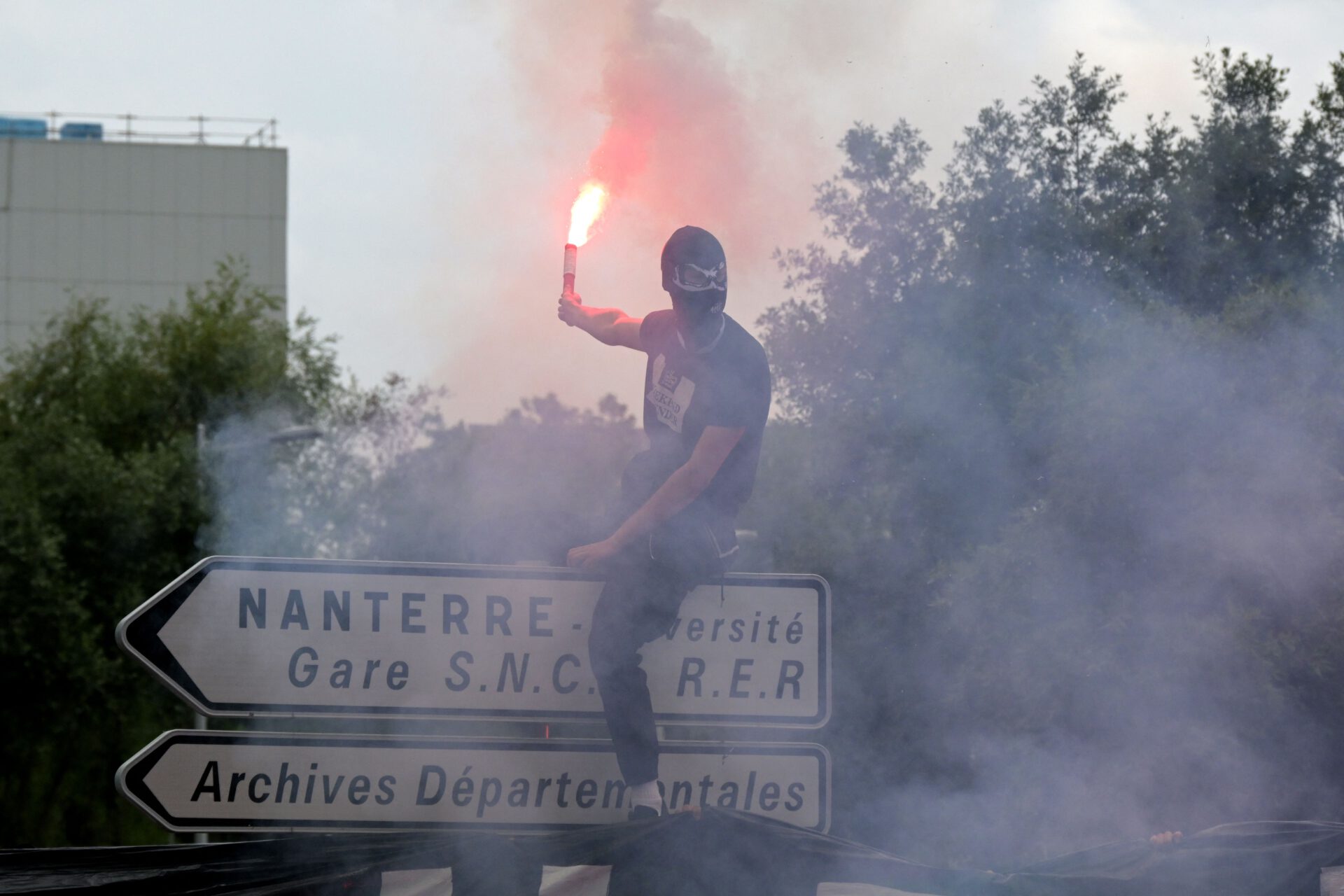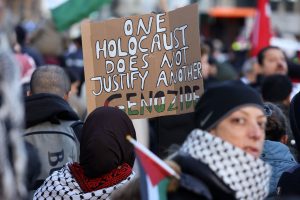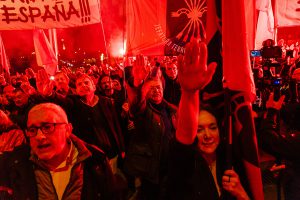On the morning of Tuesday, June 27, the people of France woke up to find a nightmare had come to life. In Nanterre, a suburb of Paris, the police had killed again—this time a 17-year-old teenager called Nahel Merzouk. The incident occurred after Nahel and his two passengers were pulled over by the police near Nanterre-Prefecture train station. One of the officers pointed a gun at Nahel’s head and threatened him—shouting “Hurry up! Or you’ll get a bullet in the head!”—and hit him. Frightened, Nahel took his foot off the brake of his automatic transmission car, which was starting to move forward again. That’s when the officer shot and killed him.
Initially, the police attempted to shift the blame by claiming self-defense, but a video of the incident quickly circulated, exposing the truth.1 Not only had the police killed a young man, but they had also tried to blame the victim for his own death. In a working-class suburb where residents have been victims of police harassment and violence for decades, this most recent police crime was the final straw. It wasn’t long before public anger exploded. Starting that Tuesday evening, uprisings broke out in several French cities, including Lyon, Bordeaux, Toulouse, and Lille. People expressed their anger by starting fires, burning cars and public buildings, as well as clashing with the police.
Contrary to the prevailing media narrative that labeled the rebels as nihilistic, their targets held significant political meaning. When a group of youths besieged a public finance center near Nancy,2 they were protesting about the class-based tax system. The destruction in wealthy districts of Paris, such as Rue de Rivoli and the 12th Arrondissement,3 struck at the core of French bourgeois society. The burning of the Olympic Games construction site reflected the militant slogan of the pension reform movement: “No withdrawal [of the pension reform bill], no Olympics!”4 In Lyon, when fascist groups ambushed young people from immigrant backgrounds,5 they defended themselves in a powerful anti-fascist response.
Systemic Racism
Beyond the sheer senselessness and brutality of the police crime committed, what is it that caused such a significant reaction to the murder of young Nahel? To understand the situation and its political implications, it’s important to remember that the victim was not just any young man: he was a young, non-white, working-class male. Indeed, police violence affects Black and Arab people 20 times more than white people, according to a 2017 report by the French Ombudsman.6
Two young demonstrators we met in the Paganini neighborhood in Paris’ 20th Arrondissement told us about their everyday experience as Arabs in the presence of the police: “They’re always putting on pressure, they’re always passing by, it’s all unnecessary checks, insults, remarks, it’s all the time. It’s non-stop. And there are no breaks, no respite. They spit in our faces, they insult us, they give us unfair fines. They set the rules and we exist as their servants. They want us to do as they please.”
But it’s not just a question of racism within the ranks of the police, which has been widely condemned by institutions such as the UN and the EU.7 The same is true for access to employment: according to another study conducted by the same institution, “in metropolitan France, real or supposed [immigrant] origin is the second most common criterion for discrimination after gender” and “11% of individuals declare having experienced one or more discrimination(s) on the grounds of [immigrant] origin or skin color over the past five years.” The report also mentions that “Men who are descendants of immigrants from North or Sub- Saharan Africa […] have an average monthly salary that is 7% lower than that of men with no migratory ancestry. “It’s even worse when it comes to access to housing: “people with an Arabic- or African-sounding names are 27% and 31% less likely respectively to get a first meeting with the landlord,” according to the same survey. What we see here is a systemic interweaving of economic exploitation and racism.
“THE FRENCH COLONIZED AFRICA, THEY WENT TO WAR IN LIBYA, THEY KILLED GADDAFI A LITTLE OVER TEN YEARS AGO, THEY COLONIZED LOTS OF COUNTRIES, THEY WERE IN THE MIDDLE EAST, THEY DID ATROCIOUS THINGS […] AND TODAY THEY’RE COMPLAINING ABOUT YOUNG PEOPLE BURNING GARBAGE CANS AND CARS TO DEMAND JUSTICE.”
Returning to the question of police violence against people of color, this is multiplied tenfold in the suburbs, where thousands of poor immigrants and descendants of immigrants are crammed into dilapidated housing projects, making them more likely to oppose the injustices they face. The authorities’ obsession with racist, class-based control has led to numerous deaths among the inhabitants of these neighborhoods, which anti-racist activists are now dubbing full-on “executions.”
If this all sounds familiar, remember that the uprisings in the French suburbs in 2005 were lit by the deaths of two teenagers, who were electrocuted inside an electricity substation while they were trying to escape from police harassment. Eleven years later, in 2016, Adama Traoré, a Black man, was killed in a similar way to George Floyd in the United States in 2020: asphyxiation at the hands of a police officer. The following year, in 2017, the “Théo affair,”8 in which a police officer inserted a baton into the victim’s anus during the arrest of a 22-year-old man, was yet another scandal, sparking outrage in many of France’s working-class neighborhoods. More recently, Alhoussein, a 19-year-old, was killed by police in Angoulême only two weeks before the murder in Nanterre.9 The list goes on and on, and the examples provided here refer only to the best-known cases of police violence and are only the tip of an iceberg including less subtle forms of violence suffered day after day by people of color in France.
However, police brutality is not even considered a form of violence in French society, mainly because of the media discourse that tends to legitimize police repression and demonize the resistance of local youths. The two protesters we met in the Paganini district shared with us their insightful view of the situation:
“The problem in France is that violence is pointed out when it involves us, the Blacks and Arabs because a young person who lights a firecracker on the police is going to be considered more shocking than a policeman who rams a baton into a young person’s anus, as was the case with young Théo a couple of years ago. When they’re the ones committing extreme violence, strangling young people who are just leaving for work, because the policeman took it badly when he insulted him, that’s what’s violent. But young people who revolt because they’re constantly being killed, harassed, or attacked, that I call self-defense.”
A History of “Outcasts”
To grasp the full extent of the deep-seated anger felt by France’s poor and non-white populations, it is necessary, in addition to an analysis of the mechanisms of state racism, to understand the country’s colonial history. Shahin, an anti-racism activist, and journalist based in the Paris region who spoke to us mentioned France’s colonial past and how it relates to current events: “The French colonized Africa, they went to war in Libya, they killed Gaddafi a little over ten years ago, they colonized lots of countries, they were in the Middle East, they did atrocious things […] and today they’re complaining about young people burning garbage cans and cars to demand justice.”
France has a long history of colonialism. From the end of the 19th century onwards, it acquired vast colonies, particularly in West Africa: Senegal, Niger, Benin, the Ivory Coast, and others. Specific legislation (“Code de l’indigénat”) was soon introduced for the Indigenous populations, subjecting them to a system of laws far more restrictive than those imposed on the French. As a result, colonies rich in natural resources (palm oil, dyewood, rubber, etc.) were plundered by French companies for over seven decades.
Throughout this period, revolts by oppressed peoples undermined the colonial regime, but it was only in the second half of the last century that these struggles became more structured and won lasting victories, enabling the prospect of independence to be contemplated. Although most of the French colonies achieved political independence between 1945 and 1977, France and its multinationals often retained control of key economic sectors. It’s worth pointing out, however, that not all the colonies gained their independence, and that it’s in these “overseas territories” that police still fire live ammunition at demonstrators when revolts break out, as in New Caledonia in 2020,10and most recently in Mayotte and French Guiana, where a man was killed during a demonstration against police violence. 11
After so many years of political, cultural, and economic exploitation by France the French imperialists caused destructive civil wars to disrupt the newly formed states’ attempts to take control of parts of their economies. As a result, many workers from the Congo, Tunisia, Algeria, Senegal, and other countries were forced to leave their countries, enticed by French companies to work in sectors that offered low wages and lacked proper protection.
When they arrived in France, they were subjected to the worst working conditions. State-owned companies were just as bad as the private sector, something demonstrated by the example of the “Chibanis” (“white haired-ones” in Arabic) railway workers, who only very recently won their case against the state-owned rail company (SNCF), 12 which had discriminated against them for decades by paying them below the statutory wage rates.
When capitalism once again found itself in a spiral of decline from the 1970s onwards, the first to be hit by the crisis were the most precarious members of society, namely immigrant workers. Mass unemployment, which began to take root in the following decade, ravaged generations of immigrant descendants, trying to survive in a country that treated them as second-class citizens due to their class, skin color, and religious affiliation. Driven out of city centers, where rents continued to rise, partly as a result of gentrification many poor people of color were forced into the suburbs abandoned by the State. In French, the term used to designate the working-class neighborhoods on the outskirts of major cities is “banlieue.” This term is highly significant, as it means “place to which one is banished” or “place of the outcasts.”
The French state’s mission concerning these “banished” populations has always been to contain or imprison them within the suburbs and prevent them from rebelling against their degrading conditions. Police control has been tightened year after year to the point of quashing freedom of movement and expression. In a long series of successive police programs implemented by right- and left-wing governments, the most recent development in the militarization and surveillance of so-called “sensitive” neighborhoods is called “Reconquête Républicaine,” (“Republican Reconquest,” instituted in 2018), which involves the deployment of several thousand additional police officers in the whole of France to further contain and suppress the outcasts in their neighborhoods. 13
A Media Campaign to Defend the Established Order
The day after the murder, a massive media operation was launched aimed at absolving the police officers guilty of the murder and accusing the victim of instigating his own death. On BFM-TV (owned by billionaire and multi-recidivist tax evader Patrick Dahi), one journalist wondered whether we shouldn’t above all “think about the sincerity of these police officers who felt threatened.”14 Without ever saying it openly, public and private television stations make it clear that it is legitimate for an armed policeman to kill a young person, regardless of whether there is a “real” threat. Wissam Xelka, one of the leading activists in the decolonial and anti-racist collective Paroles d’Honneur, points out that in the face of direct and indirect justifications for police killings, it is not a question of pretending that the victim was entirely without fault. Xelka speaks of a strategic shift on the left towards “‘innocentism,’ in other words, trying to portray the victim as pure and innocent. But who cares whether he’s innocent or not? Even the biggest scumbag doesn’t have to be killed like that at the hands of the police, at least not in a state governed by the rule of law. In a constitutional state, even such a scumbag is entitled to a trial, and shouldn’t be killed. You can see that even with a 17- year-old victim who has no criminal record, [the media and the authorities] will still say ‘but he was arrested!’ So we end up getting lost in this innocentist argument.”15
At the same time, on TV and social media, the far right’s rhetoric on the “ensauvagement” (“barbarization”) of French society—terminology directly in line with the fascist theory of the “Grand replacement” (i.e. the replacement of whites by Arabs)—has free rein, while the left is divided on the issue and is struggling to impose a clear defense of the youth on the streets as well as clear opposition to police violence. A line was crossed when former far-right presidential candidate Eric Zemmour warned of the danger of an imminent “ethnic” and
“racial” war igniting 16 a firestorm and giving succor to the most right-wing elements of the police who have argued they are under siege from the forces of “Islamo-Leftism,” a recent variant of the 20th century “Judeo-Bolshevism” conspiracy theory.
Eric Zemmour’s entourage didn’t wait long either to organize support for the police apparatus. On Thursday, his former spokesman Jean Messiha launched a GoFundMe campaign in support of the family of the policeman who killed Nahel, Florian M. By Monday morning, the fund had reached over 1,5 million euros… Meanwhile, the donation campaign for Nahel’s relatives had raised just 440,000 euros. 17
An equally interesting comparison is J. Messiha’s GoFundMe campaign in support of the police officer indicted for intentional homicide, with the 2019 fundraising initiative to help former boxing champion Christophe Dettinger, who was arrested following his heroic bare- handed defense against police officers attacking members of the Yellow Vest movement.18 While the campaign in support of the latter had been closed under pressure from the government, the call for donations benefiting the family of Nahel’s murderer hasn’t.
Beyond Riot-mongering
Many comparisons have been made between today’s events and the riots of 2005. And while in terms of the style of revolt – arson, clashes between police and the youth – the two events are similar, the broader social context isn’t. Whereas in 2005, the major anti-government struggles still mostly took place within the more or less institutionalized and pacified framework of the trade union movement at a time when capitalism and French political institutions were not yet totally bankrupt, this allowed the government to make more concessions to the movements. However, the current context is that of a powder keg of class struggles: the slightest austerity measure, the slightest authoritarian move by the police leads to the outbreak of massive revolts beyond the control of political parties and trade unions.
Shahin, our local correspondent, summarized the situation as follows: “Today’s protests are much bigger and more widespread. In 2005, the revolt lasted almost a month. But today in just three days, the whole of France has been traumatized. Because in less than three days, these young people have brought the country to a standstill. […] In terms of the intensity of the revolt, it’s much stronger than in 2005.”
The racism deeply rooted in the institutions of French society has many similarities with what we see in other European imperialist countries, such as the UK and Germany. And while the type of rioting we’ve seen repeatedly in France differs from the revolts of people of color in other European countries, we’ve also seen anger spread very quickly to surrounding countries, such as Belgium and Switzerland. 19
However, a major contradiction that progressive and anti-racist forces will have to resolve in the times to come, barring a reoccurrence of the same scenario in a few years, is how to transform anger and militant vigor into a large-scale political movement capable of achieving victories and wresting new rights. Wissam Xelka said that
“We anti-racist activists have a responsibility. We’re not riot mongers. Because these riots are also the sign of a political desert. [The uprisings] are due to a lack of self-organization in the neighborhoods.”20 In other words, we need to overcome the lack of a clear political project that “banlieue” rapper Medine described in his 2020 song “Grand Médine”: “You [the banlieusards] don’t have any great wars, any great causes to sacrifice yourself to.”21
One thing is certain: the suburban communities won’t be fooled. They don’t trust politicians who go along with them purely out of opportunism by promoting identity politics and who have no real solutions to racist oppression and capitalist exploitation. An anecdote recounted by Shahin very aptly sums up this attitude on the part of the suburban population:
“When left-wing MP Carlos Martens Bilongo came to the Pablo Picasso neighborhood in Nanterre to talk to the people, to say he was with them, the residents chased him away. They told him to leave. Because politicians want us to vote for them, but once they’re elected, […] they go on with their lives, and it’s never made any difference to us.”
There you have it, proof of the existence of real political intuition at the very heart of French suburbs.




